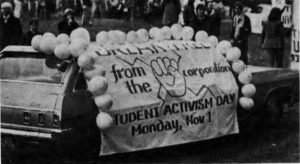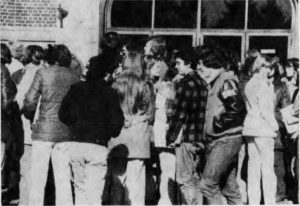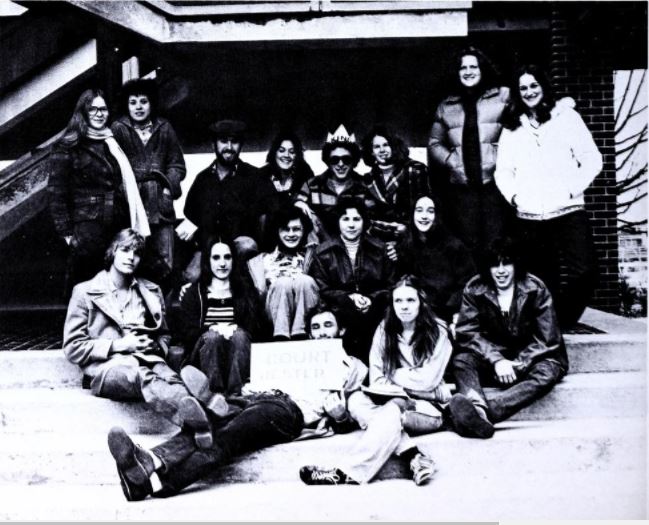“This Week in Muhlenberg College History” will bring to light past events, individuals, and forgotten aspects of Muhlenberg history that have been buried within the College’s 169 years of existence.
With SGA elections coming to a close, it is important to talk about the importance of student input on campus. Whether in its current form of the Student Government Association or under its previous form of Student Council, a body of student leaders has always been an important catalyst on Muhlenberg’s campus. One such event was the lengthy battle of student representation at faculty meetings.
The story began with the October 21, 1976 headline “Activists express displeasure over lack of representation.” While planning for Student Activism Day to be hosted on Nov. 1, Student Body President Jeff Dobro ‘77 said that the sit-in planned for the day would be symbolic of many issues seen by the student council. One of the biggest issues was the inability for students to voice their opinions. The Weekly writes “the basic issue of communication was viewed as, perhaps, the major problem facing the student body, if not the entire college community.” They decided to focus this issue on the inability to sit in on faculty meetings. By the end of the meeting, the proposed sit-in was actually widely voted down by “the nearly 100 people present.” The College Committee on Student Affairs (CCSA) feared faculty backlash to a sit in so encouraged Dobro and the Council to step down. Dobro, however, scheduled a special meeting with the CCSA the next day. Not only were they interested in student representation in faculty meetings, but the CCSA also considered other requests including a Muhlenberg Theatre Association constitution. The Weekly showed the importance of this meeting, saying, “the CCSA avenue is the only remaining non-militant road open to Berg Students.”

In its “Comments” section, the Weekly opened up on the issue and gave their personal opinion on the manner. It reads “the administration has told us time and time again that we should use existing channels to communicate our desire to be heard… This far attempts at accomplishing this have been met with criticism and bitter defeat.” The article also goes on to say that in the past, the faculty has “implied” that even if students were granted access to meetings, they wouldn’t know “what is good for them academically.” After calling the opinions of the faculty “nearsighted,” they concluded the article by saying that if the proposal was to fail, it would serve as an example of the faculty’s belief that “students can not be trusted.”
The following week, the CCSA and the proposed ruling were again in the headlines. After the meeting with the CCSA, Dobro “expressed optimism” on the progress of getting student representation into faculty meetings. When asked what a possible counter argument to their request could be, Dobro replied, “I thought, and thought, and thought… and I couldn’t think of one single reason.” With the CCSA’s official support, the final hurdle was now if the four selected student delegates allowed to attend the next faculty meeting could argue their point effectively enough to allow representation at future meetings. These four students would be the Student Body President, Editor-in-Chief of the Weekly, one Student Council Member, and one student elected through the Student Body. Then College president John Morey declined to comment his opinion on the matter, claiming it was only “a faculty matter, and, as such, the proposal would be handled by them.” One member of administration that did comment, Dean of Students Dr. R. Dale LeCount, was optimistic, claiming the ruling “will probably pass the faculty” unless major changes to the proposal were made. As it stood, the proposal called for the four student representatives to have a right to the floor and the right to report to the student body any non-confidential matter discussed. The proposal, however, did not allow the students any right to a vote.

The next week, November 4th, saw the triumphant headline “Faculty passes observer proposal.” The proposal passed by a vote of 48-38, however it had to be amended before it passed. Instead of the original four student positions proposed to be representatives, the faculty committee instead called for the four students to be “chosen from each of the existing groups of student representatives to faculty committees.” These groups consisted of the Academic Policy, Curriculum, Library, and Teacher Education Committees. The reason for the amendment was due to debate over the motivations of the original four representatives. The faculty felt that the representatives would be “politically-oriented” and therefore would “not be the best possible representation” for the student body.” As it now stood, the four representatives were to be chosen by a group of nine students, none of which were Student Body President Dobro. Though he was not able to represent the student body this time, Dobro still supported the amendment, “securing student representation in faculty meetings” over any personal wants.

In the Comments article, the Weekly again spoke about the student representation, which they called “acceptable” in its passing form. The Weekly also took their time to thank the faculty “for their interest in giving the proposal a fair chance for survival.” The article then went on to debunk some of the supposed faculty concerns after the proposal passed. The article claimed that some faculty members now felt that any discourse would be “dominated by the demands of student masses.” In an attempt to offer some clarity, the article stated that “the intention of the proposal is to open up new lines of communication between student and faculty members.”
Mirroring our current campus political discourse, the student government elections were also underway. The platforms of eight candidates for both officers and members were published in the paper. Of those eight, all but two mentioned either the specific faculty proposal or a generic need for improved student representation in administrative matters. Though the “platforms” of the current batch of SGA hopefuls are varied, let us hope they all fight for the same change and improvement their predecessors fought for just 41 years ago.
Karl Schultz is a Senior with a History major, German minor, and a certification in secondary education. He began writing for the Weekly his freshman year after his roommate, now Editor-in-Chief, forced him to. He mainly writes about Muhlenberg College's forgotten past through his "This Week in Muhlenberg History" segment.






















